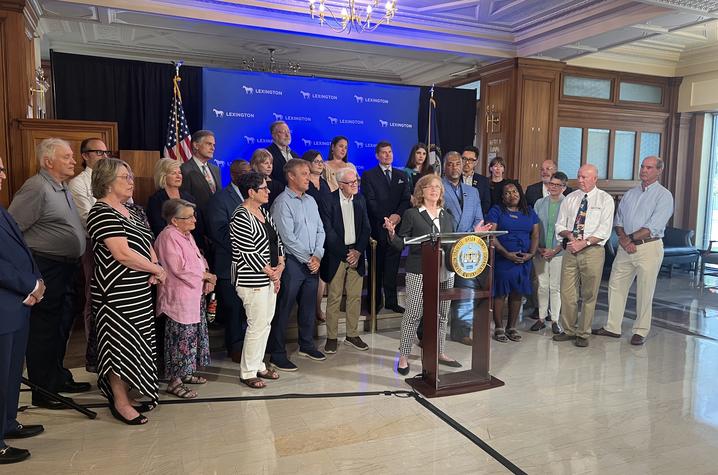Lexington celebrates 20 years of being smoke-free
LEXINGTON, Ky. (June 30, 2023) — The city of Lexington celebrated the 20th anniversary of its historic smoke-free ordinance today in a ceremony at the Lexington-Fayette Government Center.
“Lexington’s smoke-free law has had an enormous impact on the health of Lexington citizens. In terms of public health, it is one of the most important, if not the most important, ordinance we have passed in the last 20 years,” Mayor Linda Gorton said. “It has saved countless lives. I am proud to have left a public health legacy for all workers and residents.”
The Lexington-Fayette Urban County Council voted 11-3 to enact the first smoke-free ordinance in Kentucky on July 1, 2003. At the time, there were no smoke-free laws anywhere in the Midwest or Southern region of the U.S.
Lexington’s smoke-free law prohibits smoking and e-cigarette or vape use inside workplaces and indoor public places. As a result, Lexington became a public health leader in much of the country.
The law was strengthened in 2014 when e-cigarettes, addictive and popular among youth, were added.
After Lexington’s smoke-free law took effect there was a reduction in heart attacks and emergency department visits for asthma, and the smoking rate in Fayette County declined nearly 32%, resulting in 16,500 fewer smokers for an estimated annual health care cost savings of $21 million.
In 2009, Lexington’s smoke-free law paved the way for the University of Kentucky to adopt a tobacco-free campus to protect the health of students, employees and visitors.
“One of my proudest accomplishments as president was when we became the first tobacco-free major university in the U.S.,” said Lee T. Todd Jr., former UK president.
Since the tobacco-free campus policy went into effect, over 1,000 students and employees have taken part in UK’s tobacco treatment services.
In the 20 years since Lexington’s smoke-free law passed, 57 additional Kentucky municipalities have passed smoke-free laws, protecting 38% of Kentuckians.
“Our research reveals that smoke-free laws save lives in many ways. Kentucky communities with strong smoke-free laws have fewer new cases of lung cancer, fewer hospitalizations for emphysema, fewer preterm births, and fewer youth who use tobacco,” said Ellen J. Hahn, professor and director of BREATHE at the University of Kentucky College of Nursing.
BREATHE is a multi-disciplinary research, outreach, and practice collaborative of the UK College of Nursing. BREATHE’s vision is that all people will have access to clean air and live in healthy environments. BREATHE’s mission is to promote lung health and healthy environments with at-risk populations to achieve health equity through research, community outreach and empowerment, advocacy and policy development, and access to health services.
Lexington’s smoke-free law was challenged by a lawsuit shortly after enactment. The Kentucky Supreme Court upheld the ordinance in 2004. The court stated that cities and counties not only have the right to pass a smoke-free ordinance, but it is also their manifest duty to promote and safeguard public health.
“The Supreme Court’s opinion is one of the landmark cases on home rule and the most important case in local control history,” said J.D. Chaney, executive director of the Kentucky League of Cities. “It was an honor to participate and help shape the final opinion through League participation.”
As the state’s flagship, land-grant institution, the University of Kentucky exists to advance the Commonwealth. We do that by preparing the next generation of leaders — placing students at the heart of everything we do — and transforming the lives of Kentuckians through education, research and creative work, service and health care. We pride ourselves on being a catalyst for breakthroughs and a force for healing, a place where ingenuity unfolds. It's all made possible by our people — visionaries, disruptors and pioneers — who make up 200 academic programs, a $476.5 million research and development enterprise and a world-class medical center, all on one campus.






